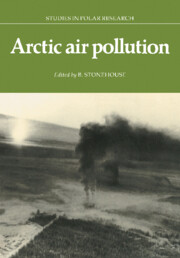Book contents
- Frontmatter
- Contents
- CONTRIBUTORS TO THIS VOLUME
- FOREWORD
- INTRODUCTION: INTERNATIONAL SYMPOSIUM ON ARCTIC AIR POLLUTION
- Part 1 Composition, source areas and transport pathways
- Part 2 Local, regional, global, ecological and climatic implications
- Part 3 Health and ecological issues
- Part 4 International cooperation and state responsibility
- The impact of human and industrial activities on the Arctic environment: legal considerations and international liabilities
- Cooperation of China, Japan and United States in the study of long-range aerosol transport to the Pacific and Arctic
- International scientific cooperation in the Arctic: problems, opportunities and US responsibilities
- Arctic haze and bush Alaskan villages
- Arctic air pollution and Alaska's concerns
- Modern life systems of indigenous people of bush Alaska
- 5 Conclusions
- Index
Arctic air pollution and Alaska's concerns
Published online by Cambridge University Press: 03 May 2010
- Frontmatter
- Contents
- CONTRIBUTORS TO THIS VOLUME
- FOREWORD
- INTRODUCTION: INTERNATIONAL SYMPOSIUM ON ARCTIC AIR POLLUTION
- Part 1 Composition, source areas and transport pathways
- Part 2 Local, regional, global, ecological and climatic implications
- Part 3 Health and ecological issues
- Part 4 International cooperation and state responsibility
- The impact of human and industrial activities on the Arctic environment: legal considerations and international liabilities
- Cooperation of China, Japan and United States in the study of long-range aerosol transport to the Pacific and Arctic
- International scientific cooperation in the Arctic: problems, opportunities and US responsibilities
- Arctic haze and bush Alaskan villages
- Arctic air pollution and Alaska's concerns
- Modern life systems of indigenous people of bush Alaska
- 5 Conclusions
- Index
Summary
As Senior Science Advisor to the Governor of Alaska, one of my responsibilities is to acquire from the various state agencies a list of research needs, and to identify who within the universities and industries can resolve those needs. Another task is to interact with the recently established federal Arctic Commission, which is the vehicle for national and international scientific cooperation. The Arctic Research Policy Act, passed by President Reagan in 1984, has made the National Science Foundation the lead agency for coordinating arctic studies within Alaska—the only arctic state in the Union.
The newly appointed Commissioners and I had the opportunity to discuss with many citizens their concerns and hopes for the state, beyond just resource development and defense. Specifically, because of the accelerating pace and scale of developmental activities in the Arctic, concern has been expressed by Alaskans, especially native groups, about the impact these activities will have on the health of all residents in the Arctic. The current status of conducting and supporting arctic health research is inadequate. There are no medical or health research units in existence which can adequately assess problems related to occupation safety and health, or long-term environmental health consequences of life in the Arctic.
As indicated by the funding of this conference, the Alaska state government had concerns with air pollution which does not originate in the Arctic. As a result of data presented at this symposium, we see there is minimal danger to the Arctic from air pollution.
- Type
- Chapter
- Information
- Arctic Air Pollution , pp. 305 - 306Publisher: Cambridge University PressPrint publication year: 1987



